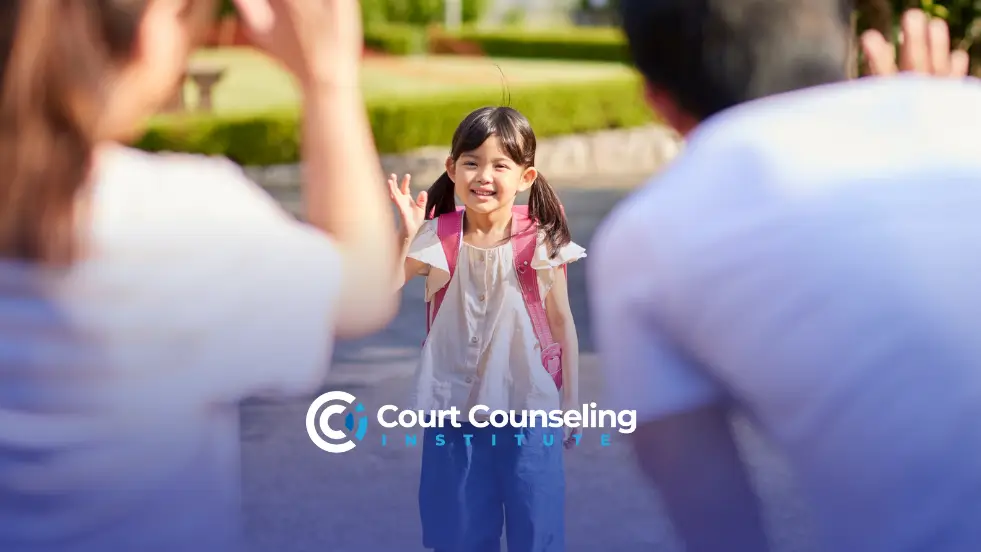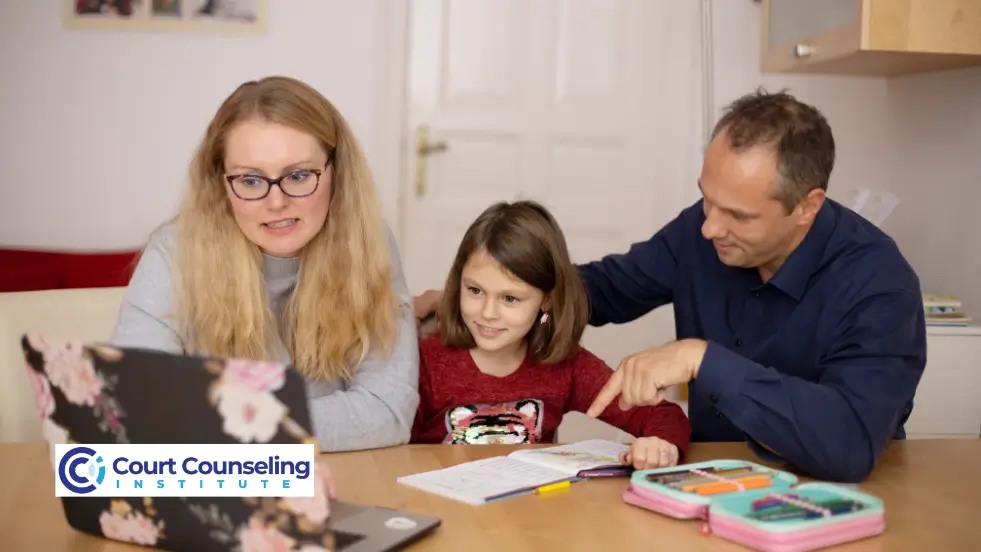
What Is Co Parenting? It Isn’t About You, It’s About Your Child
“It’s not about being together, it’s about working together.” That’s the reality many separated or divorced parents face. Even when the romantic relationship ends, the responsibility of raising your child continues. So, what is co parenting really about? It’s the ability to put your child’s well-being first, despite personal differences. Whether you’re newly separated or still working through the tension, there are ways to make co-parenting smoother. In this post, we’ll break down helpful co parenting tips, including effective co-parenting communication strategies and co-parenting conflict resolution strategies that actually work. These methods are commonly accepted by courts and have been shown to lower stress, help parents work together, and focus on what’s best for your child. With the right mindset and practical tools, co-parenting strategies after divorce can make life easier, for you and your child. You don’t have to be perfect, just committed to showing up and working together, even when it’s hard.
What Is Co Parenting and Why Does It Matter So Much?
What is co parenting? Simply put, it’s when both parents stay actively involved in raising their child, even after a breakup or divorce. Instead of working as two completely separate households, co-parents aim to make shared decisions and provide a consistent, supportive environment for their child.
Why It’s Important:
-
-
Children thrive in stability: One of the biggest benefits of truly understanding what is co parenting is the stability it creates for your child. When both parents use consistent routines, shared expectations, and respectful boundaries, children feel safer and more grounded. These co-parenting strategies after divorce help kids adjust to changes more smoothly and build their confidence, even during emotional transitions. Stability doesn’t mean perfection, it means showing up, staying consistent, and focusing on your child’s needs. That’s one of the most important co parenting tips you can practice every day.
-
-
-
It models healthy communication: Using respectful co-parenting communication strategies is one of the best ways to model behaviour for your child. They learn how to listen, speak up calmly, and resolve disagreements without yelling or shutting down. These are powerful life skills that go far beyond the home. Practicing what is co parenting means showing your child what healthy relationships look like. These positive habits, shaped by smart co parenting tips, give your child the tools to build better friendships, partnerships, and boundaries throughout their life.
-
-
-
It reduces stress: Conflict between parents creates stress, not just for you, but especially for your child. That’s why following effective co-parenting conflict resolution strategies is so important. When parents communicate clearly and work as a team, the whole household feels more peaceful. Kids are quick to pick up on emotional tension, even when it’s unspoken. Reducing arguments and improving teamwork through co-parenting strategies after divorce helps children feel emotionally safe and supported. One of the most valuable co parenting tips is simply to commit to calm, consistent communication, for everyone’s well-being.
-
Whether you’re a client meeting legal requirements or a professional guiding them, understanding what is co parenting and applying practical co parenting tips matters. It’s not just about reducing conflict, it’s about showing the court you’re putting your child first. Using effective co-parenting communication strategies and proven co-parenting conflict resolution strategies helps create a healthier dynamic. These co-parenting strategies after divorce demonstrate commitment to your child’s well-being and show the legal system you’re serious about building a stable, supportive co-parenting relationship. The Court Counseling Institute can help guide you through this process to ensure the best outcome for your family.
What is Co Parenting Conflict Resolution Strategies
Tension between co-parents is completely normal, but it doesn’t have to take over your parenting relationship. With the right mindset and practical tools, you can keep things calm and focused. Understanding what is co parenting, it is prioritizing your child’s well-being, even when emotions run high. Stick to child-centered decisions, avoid arguing in front of your kids, and set respectful boundaries. Good co-parenting communication strategies help prevent confusions, while co-parenting conflict resolution strategies can help reduce ongoing tension. Even if your co-parent isn’t always cooperative, staying calm, consistent, and solution-focused can slowly create a more peaceful dynamic. These proven co-parenting strategies after divorce are essential for building a stable, supportive space where your child feels safe, loved, and free from unnecessary conflict. The Court Counseling Institute is here to support you with expert guidance and tools to help navigate this journey successfully.

What is Co Parenting in Powerful Communication Strategies for Every Situation
Effective co-parenting communication strategies are key to successful co-parenting, but they’re not always easy to practice. Emotions, past hurt, and misunderstandings can easily get in the way, even when you’re trying your best. That’s why it’s important to understand what is co parenting first, it’s about teamwork, not personal battles. By using solid co parenting tips and proven co-parenting conflict resolution strategies, you can work through the tension and focus on your child’s needs. These tools are essential for applying practical co-parenting strategies after divorce that reduce conflict, build trust, and create a healthier path forward for everyone involved. Build better conversations with these co-parenting communication strategies:
Stick to the Facts
One of the most effective co-parenting communication strategies is to keep conversations focused strictly on your child’s needs; like school schedules, health appointments, and daily routines. Avoid bringing up past relationship issues, blame, or personal frustrations. Sticking to the facts helps reduce emotional conflict and creates space for clear, productive discussions. It also reinforces the heart of what is co parenting: working together to support your child’s well-being. By staying focused on parenting responsibilities, you build a more respectful and cooperative dynamic. This simple but powerful strategy supports healthier communication and helps keep your child’s best interests at the center.
Keep It Business-Like
Treating your co-parenting relationship like a professional partnership is one of the most effective co-parenting strategies after divorce. That means maintaining a respectful tone, setting boundaries, and focusing on raising your child. Think of it as managing a shared project where the “project” is your child’s well-being. Keeping things business-like helps avoid emotional outbursts and encourages a stable co-parenting environment. This approach supports long-term cooperation and reduces the likelihood of conflict. It’s also a great way to model emotional maturity for your child. If you’re wondering what is co parenting, this mindset is a great place to start.
Use “I” Statements
Using “I” statements is one of the most important co-parenting conflict resolution strategies. When tensions rise, saying “I feel frustrated when bedtime is inconsistent” is far more productive than “You never stick to the schedule.” “I” statements reduce blame, calm emotions, and open the door for honest, respectful conversations. This communication style makes it easier to work through disagreements without escalating them. Whether you’re dealing with discipline, scheduling, or school concerns, it’s a powerful way to be heard without triggering defensiveness. It’s also a great way to model healthy communication, an essential part of what is co parenting successfully.
Avoid Assumptions
Making assumptions is a fast track to conflict in co-parenting. If something is unclear, like a schedule change or parenting decision, just ask. Clarifying expectations early can prevent a lot of misunderstandings down the line. This is one of those often-overlooked but incredibly effective co parenting tips. It shows respect, promotes open dialogue, and helps build trust. Especially after separation, both parents are adjusting, and assumptions can easily turn into unnecessary arguments. Instead, focus on asking questions and getting clarity. Strong communication is one of the core values behind what is co parenting, and this tip is a simple way to live it.
Document Important Exchanges
Keeping written records of important parenting decisions, schedules, and agreements is one of the smartest co-parenting communication strategies you can use. It keeps both parents accountable and provides clarity if any confusion arises. This is especially useful in high-conflict situations or when the court requires proof of communication. Written documentation; whether through email, text, or a parenting app, reduces misunderstandings and reinforces mutual respect. It’s also helpful if legal matters come up later. Solid documentation supports trust, keeps expectations clear, and aligns with many co-parenting conflict resolution strategies recommended by professionals. It’s a simple but powerful tool in successful co-parenting strategies after divorce.
Co-parenting doesn’t have to be friendly, just functional. With the right co parenting tips and co-parenting conflict resolution strategies, even tough situations can improve using smart co-parenting strategies after divorce. The Court Counseling Institute is available to provide expert support and guidance to help you navigate these challenges effectively.

What is Co Parenting Tips That Keep Your Child’s Needs First
Your child is always watching; how you speak, how you react, and how you handle the ongoing process of co-parenting after divorce. Even though the romantic relationship may be over, your role as co-parents continues to shape your child’s emotional health and understanding of relationships. One of the most important co parenting tips is to never speak negatively about the other parent in front of your child. Doing so can create confusion, guilt, and emotional stress. Instead, aim for consistency in routines between households and do your best to share important milestones like birthdays, school events, and holidays.
Let your child feel free to love both parents without pressure or judgment. This emotional freedom is key to their well-being. Practicing respectful co-parenting communication strategies and using proven co-parenting conflict resolution strategies shows maturity and commitment to your child’s best interests. These small, everyday decisions are actually powerful co-parenting strategies after divorce that create a calm, supportive space for your child to grow. They also demonstrate to the court that you fully understand what is co parenting, prioritizing your child over conflict. The way you co-parent today sets the foundation for how your child will build and navigate their own relationships tomorrow. The Court Counseling Institute can provide the guidance and support needed to help you create this healthy co-parenting environment.
How Court Counseling Institute Support Strengthens Co Parenting
Co-parenting can feel overwhelming, especially when emotions are high or you’re trying to meet court requirements. That’s where Court Counseling Institute comes in. We offer supportive, court-approved programs that help you focus on what really matters: your child. Our courses are designed to teach what co parenting is all about, working together, even when it’s hard. You’ll learn practical tools like co-parenting communication strategies, how to handle conflict in healthy ways, and how to create more consistency between homes. We also include trauma-informed support for kids and parents, plus interactive family therapy activities to help build trust and connection. With guidance based on family therapy, family systems therapy, and strategic family therapy, our programs go beyond just meeting legal requirements. They’re here to make co-parenting less stressful and more cooperative. Through our flexible, online family counseling services, we’re here to help you show up as the best parenting team possible for your child.
Ready to Build a Better Co Parenting Relationship?
Explore our court counseling programs today! Contact us to connect with professionals who understand your journey and where you want to go.


